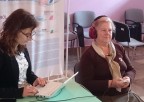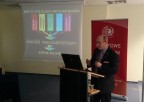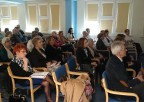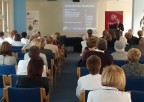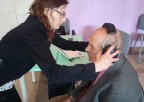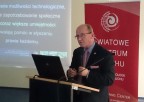Experts from the Institute of Physiology and Pathology of Hearing, who have a lot of experience in screening tests in newborns and school-age children, conducted pilot studies in older people in the Mazovia Regional Hospital in Siedlce. On that occasion Professor Henryk Skarżyński gave a lecture on the possibilities of the treatment of hearing disorders in patients over 65 y.o.
The percentage of older people will be increasing vitally. In Poland the new system of social care over older people is being developed. The Institute of Physiology and Pathology of Hearing is actively engaging in the works. Recently together with the Clinical Science Committee of the Polish Academy of Sciences, the Institute organized the meeting – debate titled “The most frequent health problems of older people in Poland” with the participation of experts from various medical disciplines and media. Institute also organized a plenary session on communication disorders in older people during 1st Congress of Healthy Aging in the Porczyńscy Gallery in Warsaw. During this meeting representatives of the government and doctors-specialists discussed over many problems and needs of the aging society.
The percentage of people over 65 y.o. is a challenge for experts of all medical disciplines. However, special attention should be played to the otolaryngology as there is a lot to do in this field. Professor Henryk Skarżyński said that it is hard to stay active with any disorders of sensory organs – either eyes or ears. Hearing loss related with aging should be detected as early as possible. Therefore, people over 50 y.o. should test their hearing every three years. Unfortunately in Poland most patients visit a doctor 10-15 years after the first symptoms appear – that is when the hearing loss starts to trouble.
Early detection of hearing disorders is possible thanks to screening tests, which had never before been conducted in this age group. Experts from the Institute of Physiology and Pathology of Hearing, who have a lot of experience in conducting screening tests in newborns and school-age children, are pioneers in this field. Recently they performed hearing tests on older people in Siedlce.
– I value the comfort of life and I know how important is to control the state of health and make regular prophylactic examinations also in terms of hearing, which deteriorates with age. – said Kinga Olędzka-Centkowska, a student from the Senior Citizen University, who did her examinations in the Mazovia Regional Hospital. – It often happens that we are not aware of some abnormalities that start occurring in our organisms. Screening tests allow early intervention. – she said.
During examinations performed in the Mazovia Regional Hospital in Siedlce 55 people in the age 57-89 were examined. Only two had normal hearing. The others suffered from hearing loss of various kinds – mainly bilateral moderate or severe hearing loss.
Epidemiological data show that three-quarters of 70-year-olds have severe problems with hearing. This negatively influences their everyday life – said professor Henryk Skarżyński. He came to the Mazovia Regional Hospital in Siedlce to give a lecture for senior citizens. Below there are some extracts from his speech:
– Seneca said “it’s not good to see everything, it’s not good to hear everything”. Today we – including us, doctors – look at this problem differently. In the information society it is good to know a lot and hear a lot. Hearing defects shatter chances for good education and impede interpersonal communication. They negatively influence the quality of life and work. Thanks to new technologies and advances in surgical methods we are able to help almost every patient, including older ones.
In our society, especially in senior citizens, a severe problem is partial deafness. There is a growing number of people whose hearing at low frequencies is good or almost good but defects come up at high frequencies. In effect, patients get worse understanding of speech. In the typical case of partial deafness patients are able to understand only about 10-15 percent of words. Fortunately thanks to implantable devices and developed surgical procedures it is possible to integrate electrical hearing with residual hearing. Ipso facto patients who had had communication problems can now hear normally.
In July 2002 I performed the first in the world cochlear implantation in a partially deaf patient. This achievement opened a new chapter in the otosurgery, but what is more important, it became a chance to help a great number of people. Hearing loss related with age is or will be a problem of all of us. The only difference between sexes is that men will see its symptoms earlier than women at the same age. We can be proud that in the Institute of Physiology and Pathology of Hearing we perform daily the highest number of hearing improving operations in the world. We can implement new solutions and use the most recent medical technologies. This means that Polish patients have easier and better access to those solutions than patients from the Western countries.
Currently the most important thing is to make more and more people (also the elderly) benefit from this chance. Worth remembering is the fact that we learn through the whole life. Also people between 70 and 75 y.o. should be able to acquire knowledge. Doctors, however, must remain patient when learning how to apply new solutions. Nevertheless, new abilities are today necessary in order to keep up with advances in the treatment of hearing disorders. Many senior citizens were disappointed that they couldn’t benefit from our solutions, i.a. because the time of rehabilitation is longer than one or two days.
Why is it worth to continue scientific works in this field? In the information society the quality of communication is more important than ever before. At the beginning of the 20th century the social status was determined in 93% by manual abilities. Currently they become replaced by communication abilities and information acquisition (94%). It must be said that the hearing loss related with age is just the beginning of patient’s problems. In the elderly, the mild hearing loss twice increases the risk of depression, moderate hearing loss – three times, severe hearing loss – five times. Taking into account the high percentage of senior citizens, which is increasing in time, it is easy to estimate how many people would suffer from hearing disorders, which impede normal life. We can imagine how this can influence social relations and communication, and how our society would look like! We hope, however, that thanks to diagnostic possibilities and treatment, which we can provide, this vision will never come true.






